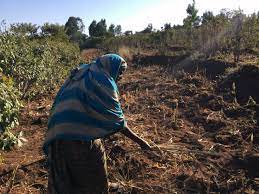
Addis Ababa, As Tigray residents recount the horrors they have faced, worries rise for people’s longer-term safety as they are left without food, inputs for planting, and high food prices and access to cash and markets. A recent CARE assessment found that the food situation in a number of areas of eastern Tigray is truly alarming, with little or no agricultural inputs available for people to recover over the coming months.
Esther Watts, CARE Ethiopia Country Director says; “this is an area that was already suffering from food security issues before the conflict, with amongst the worst malnutrition and stunting rates in the country even beforehand. On top of this northern and central parts of Tigray were also hit by the locust swarms last year. All this means that people in the region have no harvests to live off and nothing to plant during the upcoming planting season, leaving them in a truly dire situation. These impacts are compounded by the psychological trauma and fear faced by household members on a daily basis.”
Planting season begins in June. Without immediate help the numbers of people suffering from hunger and children and mothers suffering from malnutrition are likely to increase even further, to potentially catastrophic levels. This is compounded by high food prices in the markets and a lack of basic foodstuffs. Many people, especially amongst the most vulnerable groups, are also struggling to access markets to buy food, even when they are still able to afford to do so.
The Government of Ethiopia estimates that 4.5 million people need emergency food assistance until late this year.[1]
Watts adds; “People urgently need food and nutrition support. They are keen to resume their previous livelihoods activities, but they need support to acquire inputs, and most of all, they need stability and safety. Households in Eastern Tigray rely heavily on livestock, as well as on daily labor and petty trade. The continued instability and fear of displacement and looting means many are not yet ready to begin reinvesting in other livelihoods.”
Respondents told CARE that their immediate needs include food and nutrition support, non-food items (such as mattresses, blankets, kitchen utensils and jerrycans), health services, agricultural inputs, and, ultimately, peace.
One young woman interviewed by CARE in a recent assessment said; “We move with our lives in our hands. A person’s life is like a plastic bag worth 10 cents, like something you don’t try to catch when the wind is taking it.”
While another noted: “I started a petty trading business by borrowing 2,000 birr [around US $50] from a relative, after losing my poultry business of 200 chickens and all my savings. Now I make sure that I have everything I sell on a plastic mat so that I can run with it whenever I see soldiers coming.”
CARE is responding to the conflict in Tigray providing vital food, nutrition, water, sanitation and hygiene support as well as support to victims of gender-based violence as a result of the crisis. Since the beginning of its response in early December, CARE has reached more than 76,000 people across the central, southern, western and eastern parts of Tigray and bordering northern Amhara and Afar. CARE has also trained health facility workers on psychological first aid and is about to set up mobile health and nutrition services in Eastern Tigray.
The Tigray conflict has also exacerbated gender and other inequalities, perpetuating the cycles of hunger and violence that prevent millions of women and girls around the world from reaching their full potential.
According to Watts; “We know that conflicts make it more difficult for women and girls to produce, process, and provide food for themselves and their families. And we also know that they play vital roles in preventing and responding to food insecurity. Gender inequality is the reason why women and girls are differently and disproportionately affected by food insecurity, at risk of severe food crisis, and subjected to gender-based violence, both in peacetime and during conflicts. In Tigray women are telling us that they are afraid of physical and sexual violence while they are out earning an income and that sexual violence during the fighting increased.”
Source: Care


